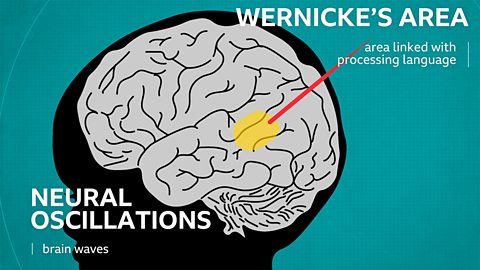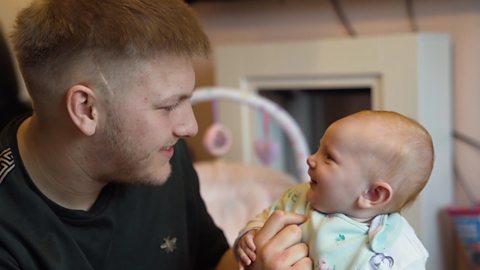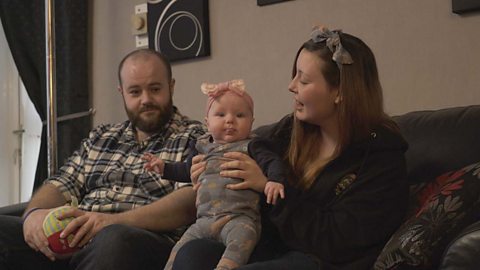Ever find yourself speaking in a 'baby voice' whenever you talk to your little one?
This is sometimes known as 'parentese' - and in fact pretty much every language wherever it is in the world has this special way of talking to babies.
But why? What is it that babies love about parentese? And can it actually help them to learn language?
We put it to the test in our speech lab and got some amazing results. Watch the full experiment with Professor Ben Ambridge in the video below.
Ben
Have you ever noticed that without even really thinking about it most people talk to babies in a high-pitched sing-song voice?This is sometimes known as 'parentese' - and in fact pretty much every language wherever it is in the world has this special way of talking to babies. But why? What is it that babies love about parentese? And can it actually help them to learn language? To find out, let's investigate baby talk.
So how old is Daisy?
Hannah
Six months old.
Ben
And do you find yourself speaking to her in that kind of sing-song voice?
Mike
Yeah it just tends to happen, doesn't it, I think?
Ben
Yeah! And does she respond well to it?
Hannah
She absolutely loves it, yeah.
Ben
Babies do seem to love it when you speak to them in this this baby talk- this parentese - so let's find out why! So first, we're gonna see how long Daisy watches you for when you're talking about your day in your normal adult voice.
Mike
So Daisy, what have we done today? So we've been to the park and we saw some ducks and we saw some dogs while we were there…
Ben
So in that one minute of adult talk Daisy spent only fifteen seconds of that looking at you. Now let's see what happens if you use parentese - or baby talk.
Mike
So Daisy, today we went to the park and we saw the ducks! All the ducks gone quack, quack, quack, quack, quack!
Ben
Wow, so that was quite a difference there. So in the one minute when you were doing the parentese - the baby talk - she looked at you for thirty-six seconds. So that was more than double the amount of attention from Daisy when you used the parentese. Research shows that babies prefer hearing the slow, higher pitch sing-song voice of parentese because it's easier for them to pick out the sounds that make up words. In fact, by using brain scans, scientists have shown that babies' brain waves - or neural oscillations - actually sync up with the rhythms of parentese. So speaking to your little one in baby talk helps their brain tune into language more easily than adult chat. So next time you find yourself doing that sing-song voice know that you're helping your little one pick up on all the sounds of their language.
Try this baby talk experiment at home
Do you want to see how much difference talking in baby talk makes to your baby? Our Speech Lab experiment is a really simple way to see it in action for yourself at home.
You might need an extra adult to help with the counting when you try this experiment but it can be done on your own as well.
To start the experiment, set a timer for one minute and chat to your baby about what you did together today. In this first part of the experiment, talk in a normal adult voice and don't exaggerate your words.
During this time, try to count up how many seconds your baby actually watches or looks at you.
Once you have this number, do the same thing again for one minute. This time, speak in parentese or baby talk. You can use gestures and make noises too.
Does your baby look at you for more time or less when you speak in this fun voice?
When we tried the experiment in our speech lab, we found a 140% increase in how much time a baby looked at a parent when speaking in parentese.
So that is more than double the amount of time that baby spends listening to your words.

What happens in your baby’s brain when you speak in a baby voice?
Research shows that babies prefer hearing the slow, higher pitch sing-song voice of parentese because it's easier for them to pick out the sounds that make up words.
In fact, by using brain scans, scientists have shown that babies' brain waves - or neural oscillations - actually sync up with the rhythms of parentese.
In one study, scientists showed infants images on a screen. They found that babies would look at the images for longer when they heard baby talk rather than normal grown-up talk.
This study also showed increased brain activity in babies hearing this kind of sing-song speech spoken to them.
So speaking to your little one in baby talk helps their brain tune into language more easily than adult chat.
Want to see this research in action? Check out the scientific experiment in this video.
Next time you find yourself doing that sing-song voice know that you're helping your little one pick up on all the sounds of their language.
Activities to boost your parentese
- Talking and playing with teddy
- Enjoy silly time with your little one
- Make bubbles more fun with a baby voice







